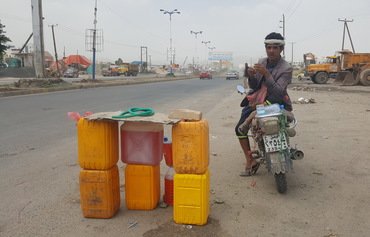The Yemeni government has denounced a recent decision by the Iran-backed Houthis (Ansarallah) to close Sanaa airport to UN aid flights, saying this will increase the suffering of the Yemeni people.
The Houthis announced the closure on Sunday (September 6th), claiming this had been necessitated by a fuel shortage, and accusing the government and Arab coalition of preventing the entry of fuel via al-Hodeidah port.
But local media outlets noted that the Houthis had on August 31st rejected a new initiative put forward by the Yemeni government, on August 26th, that proposed a solution to the impasse that has created the fuel crisis.
The government proposed to resolve the fuel shortage crisis in Houthi-controlled areas by resuming the entry of fuel shipments via al-Hodeidah port, providing that certain conditions are met.
![Oil is being sold in abundance in the black market in Houthi-controlled areas, as can be seen in this photo taken September 11th in the city of Yarim in Ibb province. [Haitham Mohammed/Al-Mashareq]](/cnmi_am/images/2020/09/14/26043-ibb-fuel-crisis-600_384.jpg)
Oil is being sold in abundance in the black market in Houthi-controlled areas, as can be seen in this photo taken September 11th in the city of Yarim in Ibb province. [Haitham Mohammed/Al-Mashareq]
These conditions included a promise that all revenue from these transactions -- customs duties, taxes or fees -- be deposited in a specially designated account that is not controlled by the Houthis, the Foreign Ministry said August 30th.
The Houthis rejected these conditions, and called on the UN to allow them to import fuel without any restrictions.
Accusations of blackmail
The government has previously accused the Houthis of violating the mechanism agreed upon with the UN by withdrawing more than 40 billion riyals ($160 million) in fuel revenue from the Central Bank's branch in al-Hodeidah.
These funds had been placed in a special account set up specifically for the disbursement of public sector salaries throughout Yemen.
"The aim of the decision to close Sanaa airport is to blackmail the international community and the UN under the pretext of having run out of fuel," Ministry of Information undersecretary Najeeb Ghallab said in a statement.
The Houthis' goal is to profit by "importing oil derivatives and pocket the generated tax and customs revenues", he said, noting that amid the fuel crisis, the militia has profited from trading oil on the black market in areas it controls.
"The Houthis, with Iran's support, are using human suffering and the oil derivatives crisis to achieve political and financial gains," Deputy Minister of Human Rights Nabil Abdul Hafeez told Al-Mashareq.
Iran "is controlling every aspect of the crisis in Yemen, including the fabrication of the oil derivatives crisis", he said, adding that it has spurred the Houthis to reject the Yemeni government's overtures.
The Houthis are exploiting the human suffering and scenes of long lines of cars at fuel stations to "pressure the international community to allow the entry of its fuel tankers in order to pocket the fees charged on these shipments", he said.
They also seek to control the distribution of the oil from those shipments, whereby they would allocate a small portion to fuel stations while diverting the rest to the black market, Abdul Hafeez said.
Houthis manipulate the situation
"The Houthis violated the agreement regarding the collection of revenues and withdrew the money from the special bank account at the Central Bank's branch in al-Hodeidah," economist Abdul Aziz Thabet told Al-Mashareq.
"The Yemeni government occasionally allowed fuel tankers to enter [al-Hodeidah port] when the crisis was reaching its peak," he said.
"It gave the UN envoy to Yemen an opportunity to negotiate with the Houthis for an agreement on oil derivatives and tax revenue generated from it, whereby it is allocated to paying salaries, but to no avail," Thabet said.
The Houthis turned Sanaa into a black market, with oil derivatives available in abundance for sale on the streets but not to be found at official fuel stations, which has generated huge profits for the militia, he added.
The Houthis refuse the entry of any oil shipment "except through al-Hodeidah port, and only those imported by their traders, because they generate tax revenue from them, and some come from Iran", he said.
Meanwhile, in Houthi-controlled areas, the prices of basic foodstuffs "have increased dramatically because they are tied to oil derivative prices", political analyst Faisal Ahmed told Al-Mashareq.
This also has increased the strain on small businesses that drive the local market, as the cost of production has increased because of the fees imposed by the Houthis, much of which go to fund their war effort, he said.

![The Houthis turned areas under their control into a black market, with oil derivatives available in abundance for sale on the streets but not to be found at official fuel stations as can be seen in this photo taken September 11th in the city of Yarim in Ibb province. [Haitham Mohammed/Al-Mashareq]](/cnmi_am/images/2020/09/14/26042-fuel-crisis-yemen-600_384.jpg)






